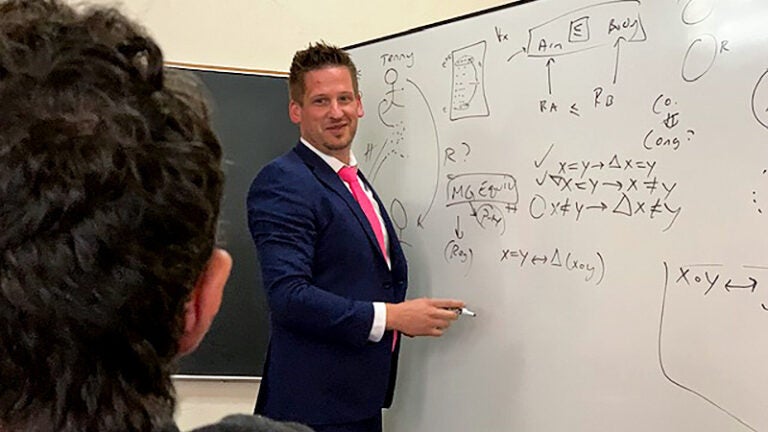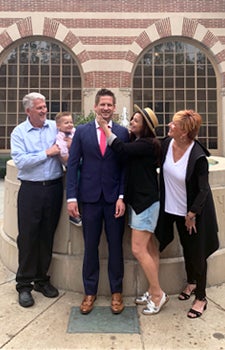
USC Dornsife philosopher wants everyone to ask themselves some big questions
A hundred miles north of Los Angeles, the city of Bakersfield sits at the heart of California’s Kern County, which produces much of the food that feeds America, from carrots to pistachios. It has also, in recent years, produced a philosopher.
Matthew Leonard, who graduates this week from USC Dornsife College of Letters, Arts and Sciences with a Ph.D. in philosophy, grew up in a close family in Bakersfield. His father was a civil engineer and his mother a homemaker — his grandfather was a pistachio farmer.
Those who knew him may be surprised that he’s come such a long way in academia. Initially unsure of his path, he let romance guide him, following his high school sweetheart Hillary (now his spouse) to California Baptist University in Riverside, California. While there, he took a class on ancient philosophy from Scott Key, professor of philosophy, and was immediately hooked. It was also Hillary who encouraged him to pursue this newfound passion as his serious career.
He attended California State University, Los Angeles for his master’s degree and began his doctoral studies at the University of California, Davis but ended up transferring to USC Dornsife to complete his degree.
What brought him to USC?
“In my opinion, it’s basically the best place in the world to do metaphysics,” Leonard says.
Metaphysics tackles the questions that underpin our reality, such as those surrounding the existence of God or what it means to live at the intersection of space and time. These seem like the exact questions a man from California’s San Joaquin Valley, a place of wide skies and never-ending fields, might ask.
Philosophy for everyone
To Leonard, philosophy is a tool for anyone, not just a rarified implement of academia. He recently spent six weeks teaching an introductory class on ethics to prisoners reentering society through the Prison Education Project. The class tackled hard-hitting subjects ranging from the objectivity of reality to the morality of physician assisted suicide. His students were enthusiastic and quickly dived into discussion, despite no formal previous training in philosophy.
“I thought to myself: ‘Here I am, a Ph.D. student at USC who thinks about these things sometimes, but there are other individuals in less fortunate circumstances who can also immediately engage and are really interested in thinking about these things.’ I realized that philosophy is really interesting to everyone,” Leonard says.

Matthew Leonard (center) with his family, including his wife, Hillary Leonard (in hat), at a reception following his thesis defense.
He’s also a philosophy and logic instructor for gifted teenagers through the Johns Hopkins Center for Talented Youth. He spends 8 hours a day with them in three, week-long immersive courses. Some may find the idea of such long hours with 15 teenagers exhausting, but to Leonard, it’s rewarding. His pupils are highly opinionated, looking to be challenged and curious to solve the universe’s puzzles. It’s a different reaction than what he experiences with many adults, who usually “roll their eyes when you ask them whether or not you think God exists, or what the foundation of morality is.”
If both prisoners and teenagers seem to find philosophy compelling, could the solution to our acerbic national dialogue actually be better training in philosophy? Leonard thinks so.
“You hear people arguing about a number of different things on the news or just on Facebook and it’s depressing when you see the lack of clarity and the lack of charity and the lack of a willingness to understand what other people are saying,” he said. “I think philosophy is incredibly important when it comes to helping people just get to the point to where they can actually have an intelligent conversation with someone.”
Two questions he’d suggest that everyone ponder, as a means to better our public discourse are: “What makes a wrong action wrong?” and “is all of the universe physical material or are there nonphysical things?” The first question alone is one he says he’ll spend a month on in a class.
Carrying the light of knowledge
Carrying his teaching experiences and enthusiasm for democratizing philosophy with him, Leonard will head back to his alma mater, California Baptist University, to teach philosophy this coming fall. It’s the same department where Key, who taught Leonard 14 years ago, still works. They’ll overlap for a year before Key heads into retirement. It just might be that the mantle of inspiring philosophy instructor will then pass to Leonard.
We may not all be able to take a Professor Leonard class, but he does have an assignment: The Lord of the Rings trilogy is top of his list for summer reading, and not just because of its page-turning plotline. The One Ring, LOTR’s focal point, is nearly identical to the Ring of Gyges in Book 2 of Plato’s Republic, which also grants the wearer invisibility. To Leonard, this is an excellent exercise in the metaphysics he’s spent more than a decade exploring.
“What do you do when no one’s looking? Would you still act justly?”